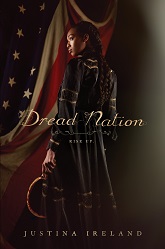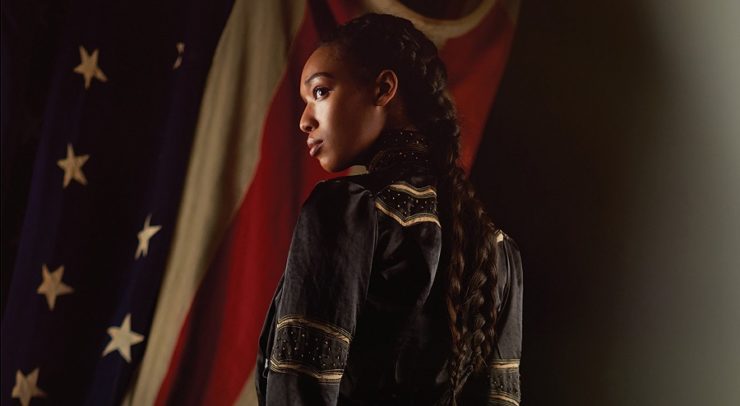In Justina Ireland’s fantastic new young adult novel, Dread Nation, the world is upended when the dead rise from their graves at Gettysburg. In order to salvage what’s left of the US, the Civil War ends in a compromise that frees the enslaved but forces them into combat schools that train them to slay the undead shamblers. Jane McKeene, a Black teen born to a white mother, is shipped off to the most prestigious of schools, Miss Preston’s, where she hones her skills. During the day she trains with other brown-skinned girls eager to be selected as an Attendant to a wealthy white family (thus sparing them from the hardship of fighting shamblers on the frontlines), and at night she haunts the countryside, taking out shamblers and saving the innocent.
When her sometimes beau, Red Jack, asks for her help in locating his missing sister, Jane and frenemy classmate Katherine run afoul of a corrupt mayor and his clan of Survivalists, a political party made up of mostly white people looking for new ways to inflict old oppressions and subjugations on African Americans. The trio are hauled off to a fledgling town in the middle of Kansas built on secrets, lies, and horrific exploitation. All Jane wants is to get back to Baltimore and find her mother, but first she’ll have to outlast flesh-eating shamblers and racist white people.
Buy the Book


Dread Nation
There are three main ways to read Dread Nation. Some readers will focus on the pop culture candy of a nineteenth century alt-history zombie apocalypse. Many (including those who call themselves allies) will relish the allegorical way Ireland explores racism, classism, feminism, sexism, and bigotry. They might even catch wind of the conversations about colorism. And then there’s the third way wherein Black Americans have a conversation with each other about our shared heritage and lived experiences.
Let me give you an example of what I mean. Early on in the book, Jane gets in trouble and frets over her possible expulsion from combat school. She knows exactly how lucky she is to be at Miss Preston’s, which offers more than a year of intense and sophisticated training. Most Black and Native kids spend less than six months in an academy before having to fight shamblers, and, as she notes to herself, the results are discomfiting to say the least: “Half the Negroes from those programs end up a shambler their first month on the job.” Poor training means dead slayers. Straightforward concept, right? Look again and you’ll see commentary on how the system is structured to offer people of color just enough to make white people seem benevolent but not enough to provide POC any substantive good (we see this again when Jane and Katherine encounter the vile Kansas preacher).
Boiling underneath Jane’s comment and Ireland’s subtext is the real history of the US. Life expectancy rates varied depending on type of work, geographic location, and personality of slaveholder, but could be as low as 22 years. Half of all infants born into slavery died before their first birthday. The average child mortality rate was 65%, but some plantations were as high as 90%. Nearly 40% of enslaved Africans born on a cotton plantation died before their fifteenth birthday—55% for those unlucky enough to be born on a rice plantation. Rice plantations were one of the worst places to be enslaved; toiling under the hot sun for endless hours in fields thick with mud and often flooded waist-high with disease and animal-infested water might kill dozens of enslaved Africans on a single plantation every season.
In Ireland’s story, the US would’ve been overrun years before had they not forced African American and Indigenous children to wage their shambler war for them. In the real world, this nation would literally not exist had it not been for slavery. Walk around a Southern city like Charleston and nearly ever brick more than 200 years old was made by enslaved African hands. If this nation was built on the backs of African Americans, African American women bore the heaviest load. So when Jane talks about needing to stay at Miss Preston’s, it’s not just a fear of becoming shambler bait that drives her. She knows as well as my ancestors did that enslavement exists on a spectrum. The knowledge of what it means to be a Black woman in white America permeates Jane’s determination and stokes the flames of fear.
We see this in action as Jane and Katherine learn to navigate the hateful town of Summerland. Throughout their time there, both girls are subjected to a new form of Black enslavement in a post-slavery world. What Jane suffers through isn’t that far fetched in our world. Research Parchman Farm and Angola Prison, two state penitentiaries constructed on the skeletons of former plantations that give the phrase “slavery by another name” a whole new meaning, and you’ll see what I mean. Katherine, too, is trapped. Her prison is gilded by tenuous privilege, but it’s still a prison. Although Katherine’s imprisonment is figurative while Jane’s is literal, both must also contend with the leers and sneers of power-hungry white men. As Black people, the Survivalists treat them as if they were draft animals, but as Black women they exist simultaneously as less than human and sexual objects to use and abuse.
Dread Nation is the perfect example of why we need more diversity in the YA author pool. Only a Black American woman could write Dread Nation. The true history of Western civilization is etched into Black bones. It is passed down through the generations not as object lessons but as fragments of memories imbued with subtext. A single sentence carries with it a tone of respectability and the implication of revolution. We teach our children and grandchildren how to interpret not only what our oppressors say but what they don’t say. We teach them to see what they do, what they refuse to do, and what they promise to do but never will. And we add those lessons to the stockpile and hope the next generation will be able to do what we couldn’t. Ireland tapped into our collective knowledge of the past and dreams for the future and poured it into Dread Nation. She revealed the truth of the real America by rewriting the fictional one.
I didn’t just love Dread Nation. I felt it down to my core. It moved me in ways I didn’t expect. The only time I had to set the novel aside was the scene where one character is whipped, not only because I was invested in their well-being but because my ancestors’ deep-rooted history came bubbling up. It was a hard chapter, not gonna lie, but it had to be there. Fortunately for me, a little while later my stress was salved by two characters having an unexpected heartfelt conversation in which it turns out both are queer. The way Ireland revealed their identities was lovely in its simplicity and sincerity.
When I think of using young adult fantasy fiction to explore systemic racial oppression, a nineteenth century zombie apocalypse isn’t the first thing to come to mind. Yet in Justina Ireland’s more than capable hands, it works. I loved the characters, the setting, the pacing, the themes, the story, and the story. In all honesty, I can’t think of a single legitimate complaint about this delightful, impactful novel. Whether or not you like it is entirely up to you, but if you don’t I’m giving you some serious side-eye.
I feel like I’m running out of ways to express how much I needed and wanted this story, and how thrilled I am that there are Black girls out there who get to have this at such a formative time. It breaks my heart that there are only four YA fantasy novels written by Black women being published this year. Think of all the Dread Nations we were denied. At least we have this here, now. And if the publishing world were smart, they’d have more like it in the pipeline for 2019.
Dread Nation is available from Balzer + Bray.
Alex Brown is a YA librarian by day, local historian by night, pop culture critic/reviewer by passion, and QWoC all the time. Keep up with her every move on Twitter, check out her endless barrage of cute rat pics on Instagram, or follow along with her reading adventures on her blog.










